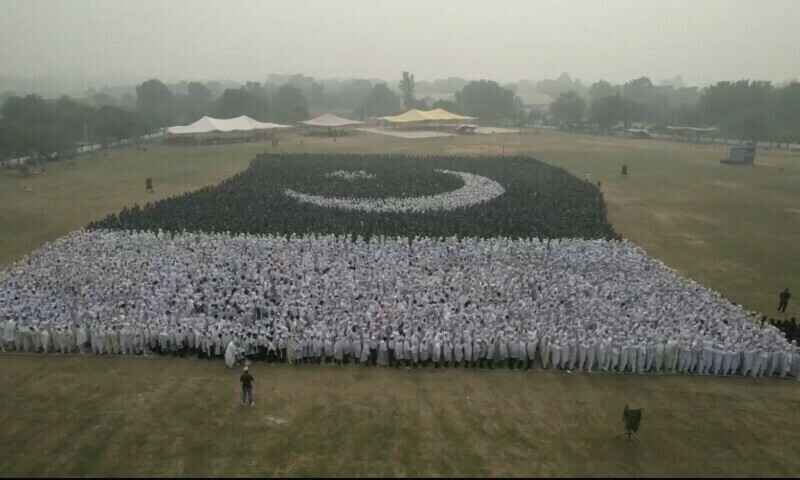

Aaj English TV
Can Pakistan Ever Become an Islamic State?
By Zahid Hussain
Ottawa, Canada

Can Pakistan ever become an Islamic state? This is a question often asked by expat Pakistanis in the West whenever there is a conversation about the motherland in a geopolitical or religious context.
The Islamic Republic of Pakistan is one of a handful of countries that were established or significantly influenced by religious motivations or identities. Other notable examples are Israel, Saudi Arabia, Vatican City, Iran (since 1979), and today’s Afghanistan.
In the case of Pakistan, there is little, if any, doubt that in its 77 years of existence, the country failed to achieve even a remote resemblance of an Islamic state. Regimes after regimes since its creation in 1947 promised to bring in measures in line with Islamic teachings; however, they failed miserably. If anything, society at present is more un-Islamic than it was when the country was established more than seven decades ago.
Many unIslamic practices result from corruption and incompetence in institutions such as the justice system, which, in most cases, provides anything but justice. Many other un-Islamic practices are due to a lack of moral character at a personal level, such as lying, cheating, and stealing at all levels. It is common to see people lying under oath and signing false affidavits without hesitation.
On the other hand, there is a noticeable increase in the number of people performing daily prayers five times and attending Friday sermons. A large number of people attend weekly and special religious gatherings where preachers supposedly talk about Islamic values and teachings. Sermons in such gatherings are not without controversy as there is a difference of opinion on many subjects among various Muslim sects.
“I went to the West and saw Islam, but no Muslims;
I got back to the East and saw Muslims, but no Islam.”
(Mohammad Abduh)
Mohammad Abduh (1849-1905), an Egyptian Islamic scholar, judge, and Grand Mufti of Egypt once observed that Western countries better reflect most Islamic institutions than do countries that profess Islam. To substantiate this observation, Professor Hossein Askari of George Washington University developed the concept of ‘ Islamicity Indices ’ in 2007 which provides a concise method of conveying Islam's fundamental teachings, a benchmark for assessing how well communities have adopted these teachings in Muslim countries and how non-Muslim countries fare when assessed against the same benchmark. The indices comprise four dimensions of Islamic teachings to measure Islamic performance which are Economy, Legal and Governance, Human and Political Rights, and International Relations.
Not surprisingly, many non-Muslim countries that are considered liberal democracies and follow a secular system of government, that keeps religion and state separate, rank better than Muslim countries. In the latest Islamicity Indices ranking which was updated in 2022, Denmark, Ireland and the Netherlands took the top three spots. Western and secular countries dominate the top third of the list. You will have to scroll down quite a bit to find the first Muslim country on the list, Malaysia at #43. Ranking of other notable countries in the list are India at #86, Saudi Arabia at #90, Bangladesh at #122, Iran at #138, Afghanistan at #148 and Syria finishing off last at the bottom of the list at #149. Pakistan ranked at #136 slightly above Iran and Afghanistan.
The dismal showing of Muslim countries, in particular Pakistan suggests that simply declaring a country Islamic or making Islam its official religion has not achieved any success in making the country an Islamic country even after seven decades of trying. On the other hand, countries that adopted a secular system where everyone is free to practice their chosen religion, and focused on providing their citizens with the basic necessities of life such as quality education, healthcare system, job opportunities, stable economies, social justice, healthy environment, good governance, peace, and security have made great progress in achieving a just society which is a hallmark of Islamic teachings as well.
Of course, not everything is rosy in the Western world as they have their own challenges of declining family values, polarization, extremism, mental health issues, income inequality, etc. However, the benefits outweigh the negatives most of which are manageable. In any case, many Western challenges have also been creeping into Pakistan's society.
Is it possible to implement Islamic teachings in today’s Pakistan or anywhere else for that matter? To envision what an Islamic state in Pakistan might look like if somehow that is achieved in the future there are three models available in today’s world that might shed some light. The Kingdom of Saudi Arabia, a monarchy that followed a Wahabi shade of Islam for decades implemented strict restrictions on its residents, citizens and non-citizens alike, that Pakistani Muslims would find unacceptable. In recent years it has started a process of modernization and transformation, the end state of which is yet to be determined.
The Islamic Republic of Iran came into existence in its current form after a revolution in 1979 overthrew the monarch, the Shah of Iran. The overwhelmingly Shia-majority country has adopted a system of governance based on Twelver Shia Islam, which is the state religion. Pakistan, a Sunni-majority country, would find many disagreements with its policies and governance principles.
Finally, the Islamic Emirate of Afghanistan, which was restored as an Emirate by the Taliban in 2021, has adopted a model of an Islamic emirate that is still evolving. As much as 90% of its population adhere to Sunni Hanafi school. Taliban have implemented strict restrictions on female education and employment and imposed a strict dress code on them in public. No country has recognized the Taliban government as the legitimate authority of Afghanistan. It is highly unlikely that the Afghan model will be acceptable just based on their treatment of women, let alone other ideological differences with the Hanafi school of thought. Despite barriers and challenges women in Pakistan have made great strides in all walks of life including politics, bureaucracy, military, judiciary, business, education, healthcare, and many other fields. They are not going back to the dark ages.
It is doubtful whether the three models mentioned above are sustainable in the long term as these are facing significant resistance and pressure from within and outside. It is clear that none of the three mentioned Islamic systems would be either applicable or acceptable in Pakistan.
What can sincere preachers do to bring about a positive change in their disciples' mindset? They have a powerful tool at their disposal which they have not effectively used in the past. Weekly Friday sermons (the Jummah khutba) provide them an excellent opportunity when they mostly have the undivided attention of their disciples. They can use this space to focus on one small teaching of Islam and seek their commitment. For example, they can emphasize the importance of cleanliness in Islam – of personal, their surroundings, and their thoughts – and announce a suitable day in the coming week for disciples to come out prepared and help clean the neighborhood of garbage, debris, etc. The news of this self-help effort, if successful in a few neighborhoods, will spread like wildfire in the rest of the country with a spinoff impact.
Given the current state of affairs, even a semblance of an Islamic state in Pakistan is unlikely in the short- and medium-term. If even small steps are taken to change the mindset of people and bring reforms in key institutions then progress can be made in that direction. We copy many virtues of Western society in fashion, performing arts, social media trends, etc.; why not copy those traits that have provided them with a better quality of life, especially if those traits happen to comply with Islamic teachings as well?
(The author is a retired engineer based in Canada and writes on international and political affairs. He can be reached at: zahid110@gmail.com )

